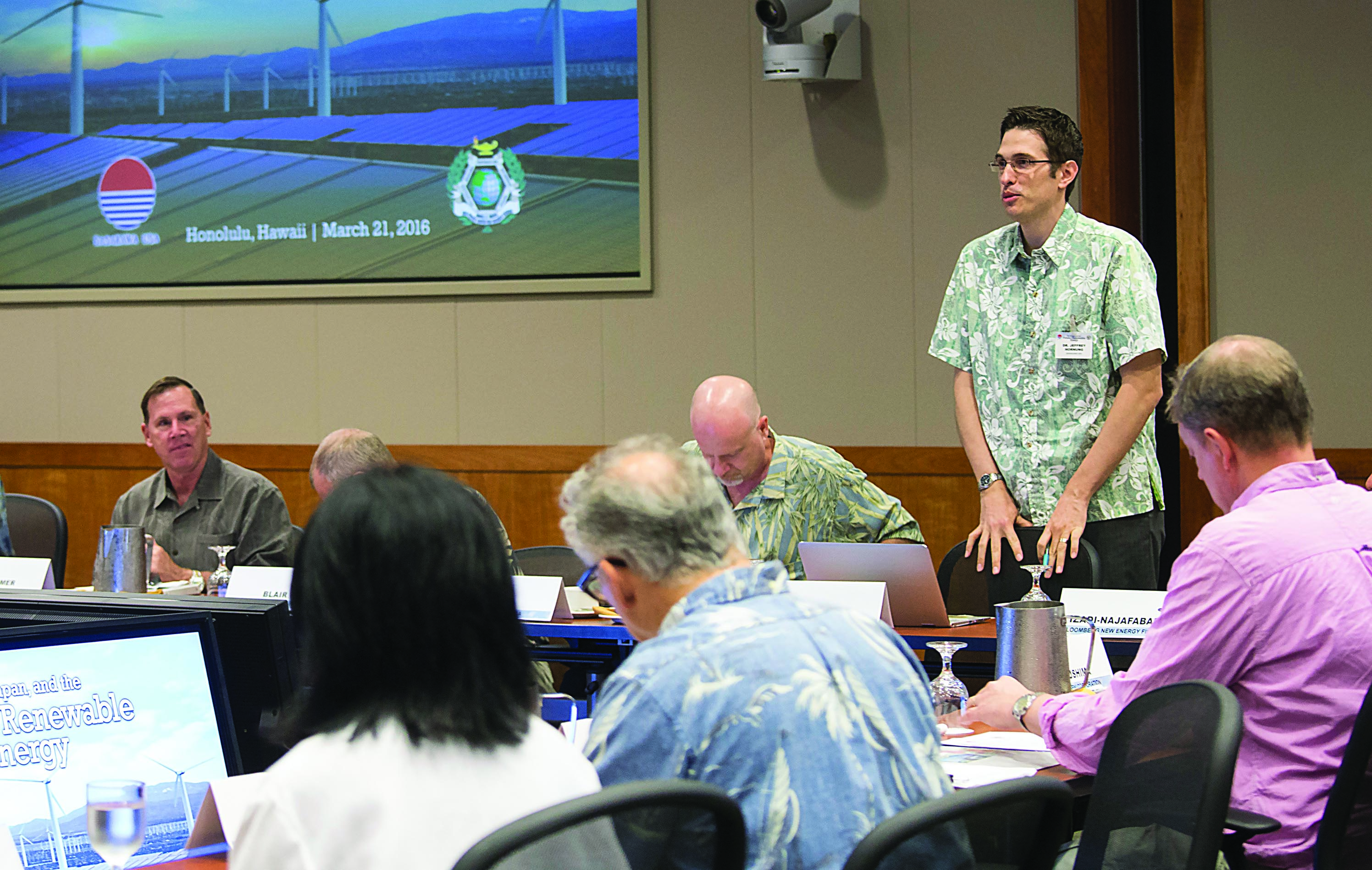DKI APCSS partnered with the Sasakawa Peace Foundation USA in conducting the event titled “The U.S., Japan, and the Future of Renewable Energy.” Participants explored opportunities for the two nations to develop, prioritize and disseminate alternate energy technologies as part of a future energy mix.

Dr. Jeffrey Hornung, a Fellow with Sasakawa Peace Foundation USA, served as lead facilitator for the March 21 renewable energy workshop at the Daniel K. Inouye Asia-Pacific Center for Security Studies. The event enabled U.S. and Japan professionals to build cooperation in development of alternative energy sources. Hornung is a former DKI APCSS professor.
“Both countries are undergoing profound change in these spheres, driven in the U.S. by the shale gas revolution and in Japan by the March 2011 events that led to the shutdown of Japan’s nuclear industry,” stated Dr. Jeffrey Hornung, Fellow for Sasakawa USA’s Security and Foreign Affairs Program. “Demand for energy has increased throughout the world, which, in turn, gives rise to a host of associated problems, including increased CO2 emissions, competition for finite energy sources, and climate change.
“Japan and the U.S. share a special responsibility in this regard given their advanced technologies and high proficiency in science that together can help move economies toward a greener, more sustainable, future. Through such interaction, it is hoped that existing barriers to cooperation can be overcome and development of economically viable renewable technology can be accelerated.”
The event featured panel discussions on “Policy, Production and Economics: Wind, Solar, and Other Renewables,” “Batteries and Other Energy Storage Technologies,” and “Smart Grids, Micro-grids and Distribution.” During the latter session, Dr. Terry Surles, with the University of Hawaii, led the group’s look at challenges facing current power grids, particularly limited ability to accommodate growing residential and business adoption of solar PV systems. The group looked at how to address this and other issues cost-effectively while trying to integrate renewable energy technology.
Dr. George Ka’iliwai III, U.S. Pacific Command’s director of resources and assessment, briefed the group on U.S. military alternative energy initiatives such as integrated photovoltaic systems at Kaneohe Marine Corps Air Station, HI, a solar PV farm at Nellis AFB, Nev., and testing or use of wind, hydrogen and wave energy systems.
By day’s end, participants identified potential areas for cooperation and next steps in the evolution of the evolving U.S.-Japan partnership in this arena.

Ali Izadi-Najafabadi, with Bloomberg New Energy Finance, shares his perspective on alternative energy issues in a seminar session during the
March 21 renewable energy workshop at the Daniel K. Inouye Asia-Pacific Center for Security Studies. At right of Izadi-Najafabadi is fellow workshop participant Mark Glick, with Hawaii’s State Energy Office.
The March 21 event was comprised of representatives from Bloomberg New Energy Finance, the Center for Strategic and International Studies, Marubeni Corporation, Japan Renewable Energy Foundation, the National Renewable Energy Laboratory, Hawaii State Energy Office, and the University of Hawaii. Also represented were Toshiba Corporation, the U.S. Energy Storage Association, Alevo Energy, Unienergy Technology, Sumitomo Electric Industries Ltd., USPACOM, Rakuten Inc., the U.S. Embassy in Tokyo, Japan’s Ministry of Economy, Trade and Industry, and the Hawaii Electric Light Company.
DKI APCSS is a Department of Defense institute that addresses regional and global security issues. Military and civilian representatives, most from the United States and Asia-Pacific nations, participate in a comprehensive program of executive education, professional exchanges and outreach events, both in Hawaii and throughout the Asia-Pacific region.
The Center supports U.S. Pacific Command by developing and sustaining relationships among security practitioners and national security establishments throughout the region. APCSS’ mission is to build capacities and communities of interest by educating, connecting and empowering security practitioners to advance Asia-Pacific security. It is one of the Department of Defense’s five regional security studies centers.